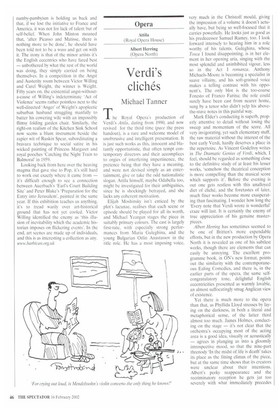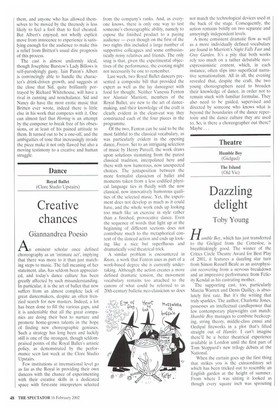Attila (Royal Opera House) Albert Herring (Opera North)
Verdi's clichés
Michael Tanner
The Royal Opera's production of Verdi's Attila, dating from 1990, and now revived for the third time (pace the press handout), is a rare and welcome model of unobtrusive and intelligent presentation. It is just such works as this, innocent and blatantly opportunistic, that often tempt contemporary directors and their accomplices to orgies of interfering impertinence, the pretence being that they have a meaning, and were not devised simply as an entertainment, give or take the odd nationalistic slogan. Attila himself, maybe Odabella too, might be investigated for their ambiguities, since he is shockingly betrayed, and she lacks any coherent motivation.
Elijah Moshinslcy isn't enticed by the plot's lacunae, realises that each scene or episode should be played for all its worth, and Michael Yeargan stages the piece in suitably primary colours. The cast is largely first-rate, with especially strong performances from Maria Guleghina, and the young Bulgarian Orlin Anastassov in the title role. He has a most imposing voice, very much in the Christoff mould, giving the impression of a volume it doesn't actually have, but being so well-focused that it carries powerfully. He looks just as good as his predecessor Samuel Ramey, too. I look forward intensely to hearing him in a role worthy of his talents. Guleghina, whose Tosca I found disappointing, is in her element in her opening aria, singing with the most splendid and uninhibited vigour, less so in the Act I romanza. Anthony Michaels-Moore is becoming a specialist in suave villainy, and his soft-grained voice makes a telling contrast with his opponent's. The only blot is the too-coarse Foresto of Franco Farina: the role could surely have been cast from nearer home, sung by a tenor who didn't yelp his abovethe-stave notes in this painful way.
Mark Elder's conducting is superb, properly attentive to detail without losing the sweep and momentum of the score. All very invigorating, yet such elementary stuff, the raw material without the interest of the best early Verdi, hardly deserves a place in the repertoire. As Vincent Godefroy writes in The Dramatic Genius of Verdi, which, I feel, should be regarded as something close to the definitive study of at least his lesser works, 'somehow the theatrical conception is more compelling than the musical score which supports it'. Before the evening is out one gets restless with this unalloyed diet of cliché, and the foretastes of later, much finer works become more exasperating than fascinating. I wonder how long the 'Every note that Verdi wrote is wonderful' craze will last. It is certainly the enemy of true appreciation of his genuine masterpieces.
Albert Herring has sometimes seemed to be one of Britten's more expendable efforts, but in the new production by Opera North it is revealed as one of his subtlest works, though there are elements that can easily be annoying. The excellent programme book, in ON's new format, points out the similarity with the contemporaneous Ealing Comedies, and there is, in the earlier parts of the opera, the same selfcongratulatory tone, delightful English eccentricities presented as warmly lovable, an almost suffocatingly smug Anglican view of existence.
Yet there is much more to the opera than that, as Phyllida Lloyd stresses by laying on the darkness, in both a literal and metaphorical sense, of the latter third almost too much. James Holmes, conducting on the stage — it's not clear that the orchestra's occupying most of the acting area is a good idea, visually or acoustically — agrees in plunging us into a gloomily introspective mood, so that the nine-part threnody 'In the midst of life is death' takes its place as the fitting climax of the piece, but at the same time shows that its creators were unclear about their intentions. Albert's perky reappearance and the recriminatory reception he gets jar too severely with what immediately precedes
them, and anyone who has allowed themselves to be moved by the threnody is less likely to feel a fool than to feel cheated. But Albert's enjoyed, not wholly explicit move from innocence to experience is satisfying enough for the audience to make this a relief from Britten's usual dire prognosis of this process.
The cast is almost uniformly ideal, though Josephine Barstow's Lady Billows is self-parodyingly gusty. lain Paton's Albert is convincingly able to handle the character's drink-driven growth, and suggests at the close that Sid, quite brilliantly portrayed by Richard Whitehouse, will have a rival in cunning and nonchalance. Sid and Nancy do have the most erotic music that Britten ever wrote, indeed there is little else in his work that competes with it. One can almost feel that Herring is an attempt by the composer to break free of his obsessions, or at least of his pained attitude to them. It turned out to be a one-off, and the ambiguities of tone that increasingly invade the piece make it not only flawed but also a moving testimony to a creative and human struggle.





































































 Previous page
Previous page